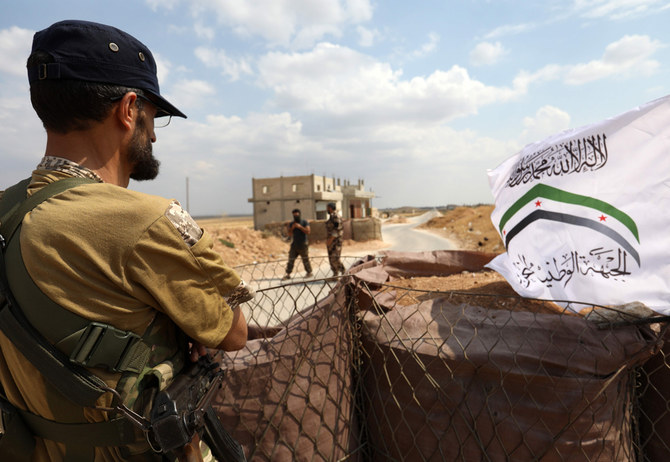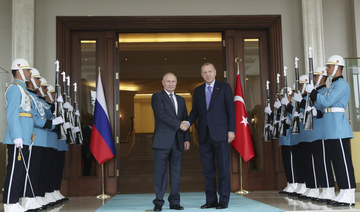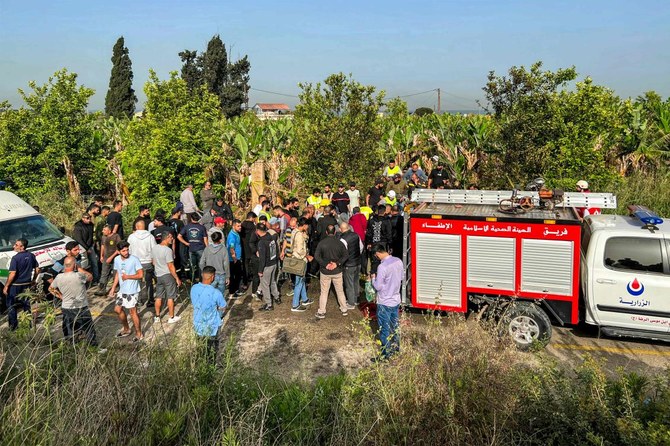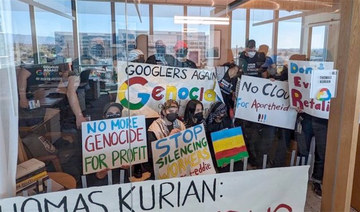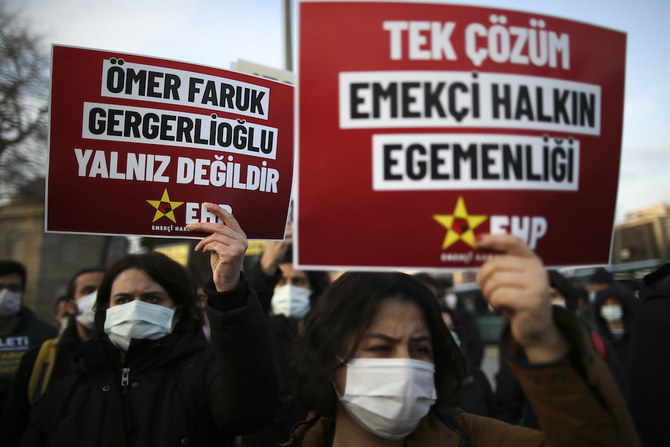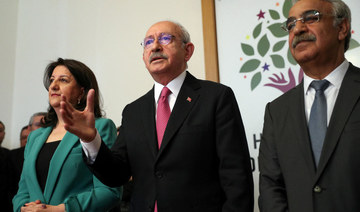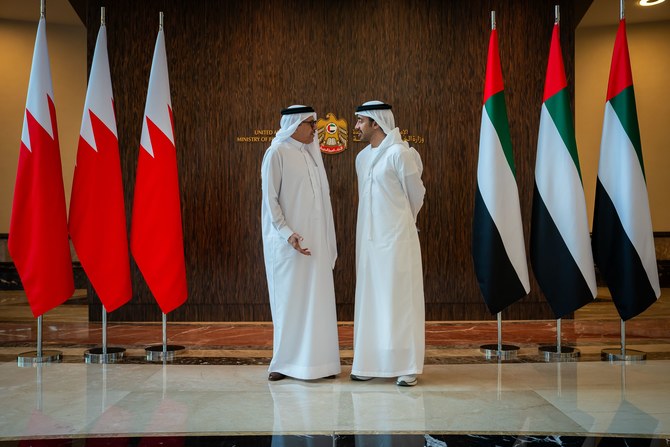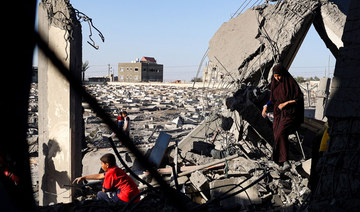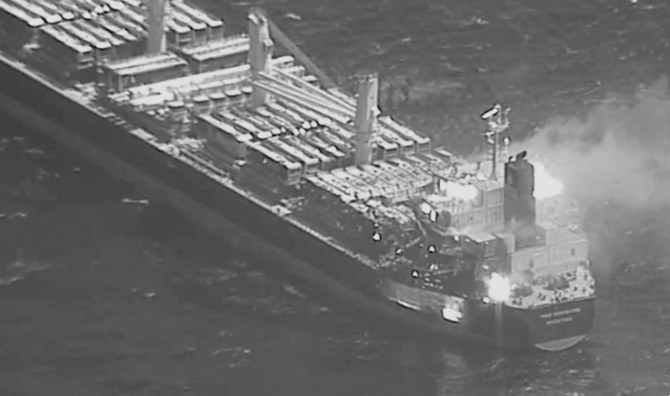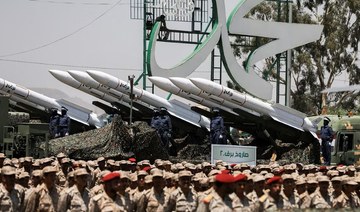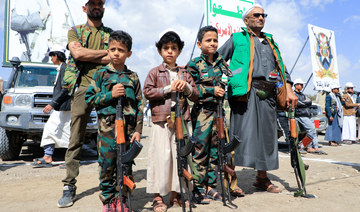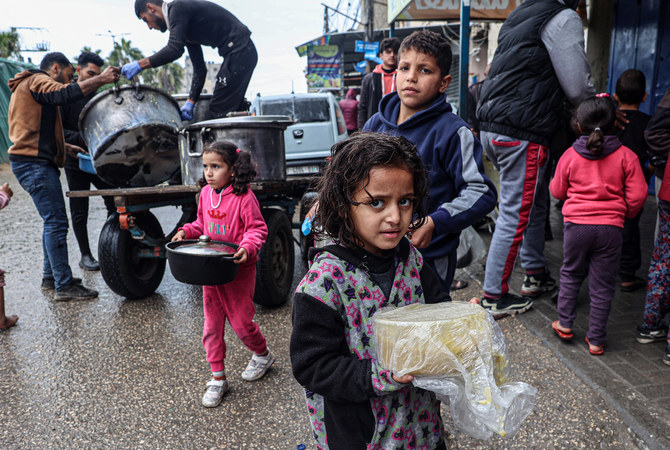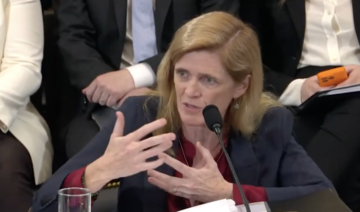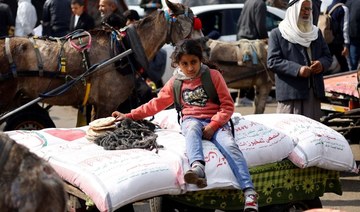NEW YORK: Russia and China vetoed on Thursday a resolution backed by the vast majority of UN Security Council members that called for a cease-fire in Syria’s northwestern Idlib province, the country’s last opposition stronghold.
The resolution demanded that counterterrorism activities comply with international humanitarian law.
Germany, Belgium and Kuwait finalized their text on Wednesday and called for a vote on Thursday.
Russia’s UN Ambassador Vassily Nebenzia told the council the aim of the resolution was “to save the international terrorists who are entrenched in Idlib from their final defeat.”
Syrian forces, backed by Russia, had targeted Idlib in a four-month ground and air offensive but civilians have been widely affected. A cease-fire that went into effect at the end of August has held despite some violations.
Germany’s UN Ambassador Christoph Heusgen countered that supporters of the purely humanitarian resolution “stand firm in our resolve to combat terrorism” — but insist that operations must ensure protection of civilians as required by international law.
The vote in the 15-member council on Thursday was 12-2 with Equatorial Guinea abstaining. Another rival resolution calling for a cease-fire in Idlib drafted by Russia and China remains to be voted on.
SPEEDREAD
Germany, Belgium and Kuwait finalized their text on Wednesday and called for a vote on Thursday. Their draft resolution called for a cessation of hostilities in Idlib governorate on Saturday.
Earlier, a senior UN official told the Security Council that the humanitarian situation in Idlib was “alarming.” An estimated 400,000 people have fled their homes in the country’s northwest in just the last four months, and around 600,000 are living in tents, camps or out in the open.
Deputy humanitarian chief Ursula Mueller said that, following months of intensive fighting and a “fragile cease-fire,” the outlook for Idlib province remains uncertain as winter approaches.
She said humanitarian organizations estimate an addition $68.4 million is required for winterization, shelter and non-food items.
Germany, Belgium and Kuwait finalized their text on Wednesday afternoon and called for a vote on Thursday. Their draft resolution calls for a cessation of hostilities in Idlib governorate at noon Damascus time on Saturday.
Soon after, Russia and China also put their rival text in a final form for a vote. It calls for a cessation of hostilities in September but gives no date. Their resolution would also include exemptions for “military operations against individuals, groups, undertakings and entities associated with terrorist group, as designated by the Security Council.”
Germany, Belgium and Kuwait, who are serving two-year terms on the Security Council, are in charge of drafting resolutions on Syria’s humanitarian situation. Diplomats said they have been meeting with Russia to try to reach agreement on a text following a spate of attacks on hospitals, health facilities and aid workers.
The diplomats, speaking on condition of anonymity because discussions have been private, said the three countries insist that the text include language that counter-terrorism activities must comply with international humanitarian law, but Russia objected.
The draft resolution by Germany, Belgium and Kuwait “demands that member states ensure that all measures taken to counter terrorism, including in Idlib governorate, comply with their obligations under international law, including international humanitarian law, international human rights law and international refugee law.”
It urges all parties to the Syrian conflict to distinguish between civilians and combatants, to apply the principle of “proportionality,” and to take all feasible precautions “to avoid and in any event minimize harm to civilians and civilian objects.”
It also stresses “that counter-terrorism operations do not absolve parties to armed conflicts of their obligations under international humanitarian law, including their obligation to distinguish between civilian populations and combatants.”
And it urges all parties to the Syrian conflict to distinguish between civilians and combatants, to apply the principle of “proportionality,” and to take all feasible precautions “to avoid and in any event minimize harm to civilians and civilian objects.”
The China-Russia draft resolution makes no mention of counter-terrorism operations but would reiterate the council’s demand for all parties to comply with international law and allow access to people in need, and to immediately cease all attacks against civilians and medical and humanitarian personnel.
It also calls for all parties to “demilitarize” hospitals and other civilian facilities and avoid establishing military positions in populated areas.
On Monday, the leaders of Russia, Turkey and Iran agreed to de-escalate the volatile situation in Idlib while combatting extremists and protecting civilians.
Idlib, which has an estimated population of 3 million, is dominated by the Al-Qaeda-linked group Hayat Tahrir Al-Sham. Syrian forces, backed by Russia and Iran, targeted the armed group in a four-month ground and air offensive but civilians have been widely affected.
Hundreds of thousands of Syrians, some already displaced from other parts of the war-torn country, have moved toward Turkey’s border.
A cease-fire that went into effect at the end of August has been holding despite some violations.
A major conflict in Idlib has raised the possibility of a mass refugee flow to Turkey, which already hosts 3.6 million Syrian refugees.
A joint statement issued at the end of Monday’s meeting said the three leaders underscored the need “to fully implement” an agreement reached between Turkey and Russia last year for a de-escalation zone in Idlib and “to take concrete steps to reduce violations.”
They expressed alarm “about the risk of further deterioration of the humanitarian situation,” according to the statement.
“We all stand for Syria’s territorial integrity and insist that after the problems of security and the fight against terrorists are resolved, Syria’s territorial integrity will be fully restored. This concerns withdrawal of all foreign troops from Syria’s territory,” the statement said.



